Attorney for Floyd says meeting with Trump and families 'very heavy' before Senate kicked off police reform hearing
This was the Senate's first hearing on police use of force since Floyd's death.
Before the Senate began its first hearing on policing reform since George Floyd's death in custody triggered a wave of protests calling for reform, an attorney for Floyd's family said there "was a heavy meeting" between President Donald Trump and select families at the White House Tuesday morning.
Outside the hearing room, Lee Merritt, one of the attorneys for the families of Floyd and Ahmaud Arbery, said "tears were flowing" at the meeting between Trump and eight families whose loved ones have fallen victim to police brutality.
"There were tears flowing in the room, but we are hoping that beyond the emotion of it that it will lead to significant policy change," Merritt said.
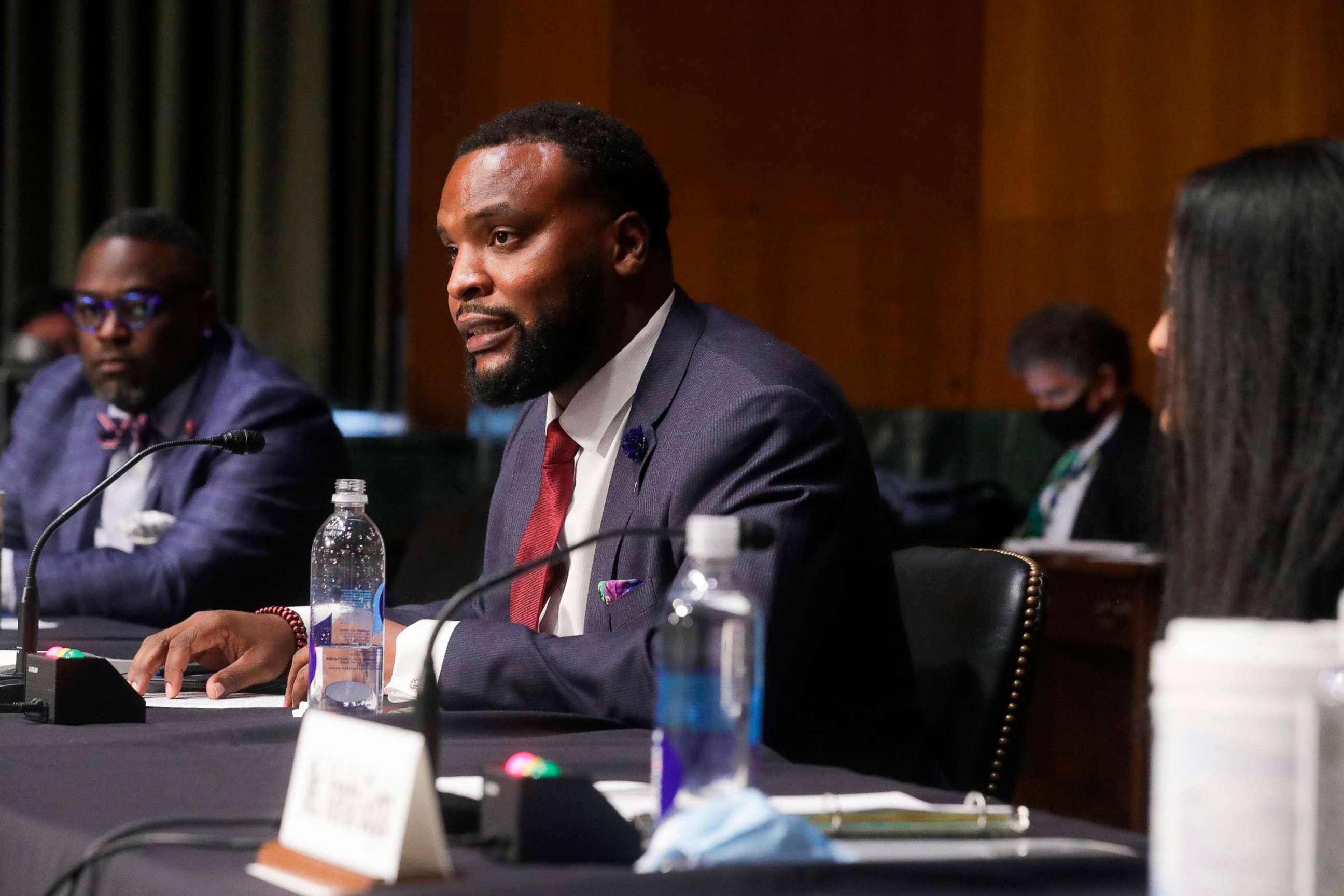
Asked specifically about Trump's reaction in the meeting, Merritt said he felt the president's concern was genuine but expressed skepticism if that would extend to those outside the room.
"I believe it was genuine concern for each of the families represented," Merritt said. "He gave no indication that the families in that room reflected a problem in America, that policy could actually resolve it -- and it can -- so that was my concern."
The president met with the families before signing an executive order aimed at encouraging police departments across the country to adopt stricter standards on the use of force.
Arbery's mother, Wanda Cooper Jones, told reporters on Capitol Hill Tuesday evening she didn't think Trump's executive order was "enough" but called it "a start."
Members from some of those families were hoping to attend the hearing, but a representative traveling with Merritt said they were told they could not come and were "really disappointed."
Instead, they were watching the hearing in the office of Sen. Tim Scott, R-S.C., the only black Republican senator who is spearheading his party's effort on reform. They were likely restricted from the hearing room due to COVID-19 precautions.

Chairman Lindsay Graham attempted to open the the GOP-led Senate Judiciary Committee with a video the South Carolina senator warned was "hard to watch" -- but technical glitches prevented it from running.
"Can we consider it an act of God?," asked Sen. Cory Booker, D-N.J.
"Could be," replied Graham.
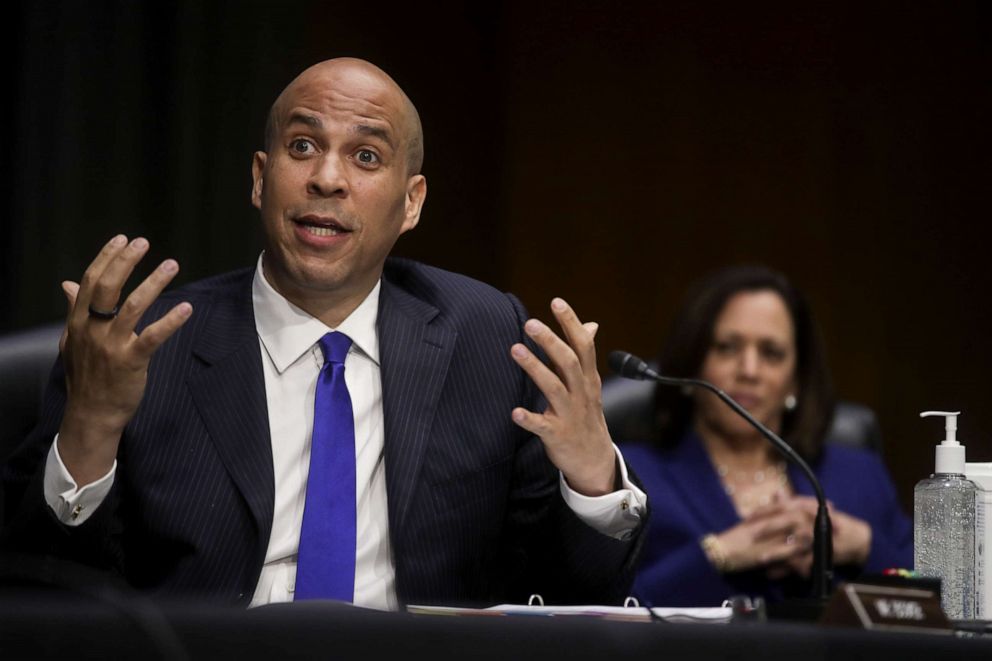
Graham continued his opening remarks, "I have learned over the years, but particularly recently, that every black man in America feels threatened when they are stopped by the cops. That it's not 99%, it is 100%."
He called for more minorities on police forces across the country and said, "Seems to me there has come a time for us to move on from chokeholds," but stopped short of saying policing had systematic racism.
"Is policing in America systematically a racist enterprise? I'd like to think not, because I do believe most cops are far more good than bad," Graham said. "But when every black man in America believes that getting stopped by the cops is a traumatic experience, something happened, somehow, somewhere. And I'd like to have a systematic approach to problems that continue to happen over and over again."
The Republican, who is up for reelection in November, made clear he did not support defunding police but was open to reform.
"I don't see a whole lot of energy here to defund the police. I see a lot of energy to reform the police," Graham said.
Graham said that Scott would present the GOP-backed legislation to the Senate on Wednesday, to counter congressional Democrats' Justice in Policing Act.
"The question for the committee, is it possible to find common ground? The answer is obviously, yes, if we want to. As chairman, I would like to," Graham added.
In later questioning, Graham acknowledged the different experiences he and Scott have faced -- though they are senators from the same state -- because of their race, but in a veiled criticism at past administrations said this issue should've been addressed sooner.
"This is a tough time for the country. Trump's a handful, but we're not here because of a failing of one administration. We're here because of the failing of society. And most of the things we want to do now could have been done eight years ago," Graham said.
"I come from South Carolina. Tim and I have completely different experiences with the cops. There is no getting around that. It is now time to have an honest conversation about why is that, how can it be that if you're a United State senator from South Carolina, and you're black, you get stopped five or six times. When you're white you never get stopped," Graham continued. "How can it be that people die because of a $20 bill, who are in custody not threatening anybody."
Expressing his hesitation with reforms to qualified immunity, Graham said, "I don't think most cops want to go into the business if they could lose their house if they make a mistake, but maybe there's something we can do with the concept of qualified immunity that would put more accountability into the agencies that run police departments."
"We don't want to deter people from going into law enforcement, but we also want to have a sense of accountability. And to the extent that qualified immunity fosters a sense of 'it's really not my problem' let's take a look at it," he continued.
Sen. Kamala Harris, D-Calif., in her opening statement, echoed a sentiment from Floyd's brother, Philonise, made last week before the House Judiciary Committee.
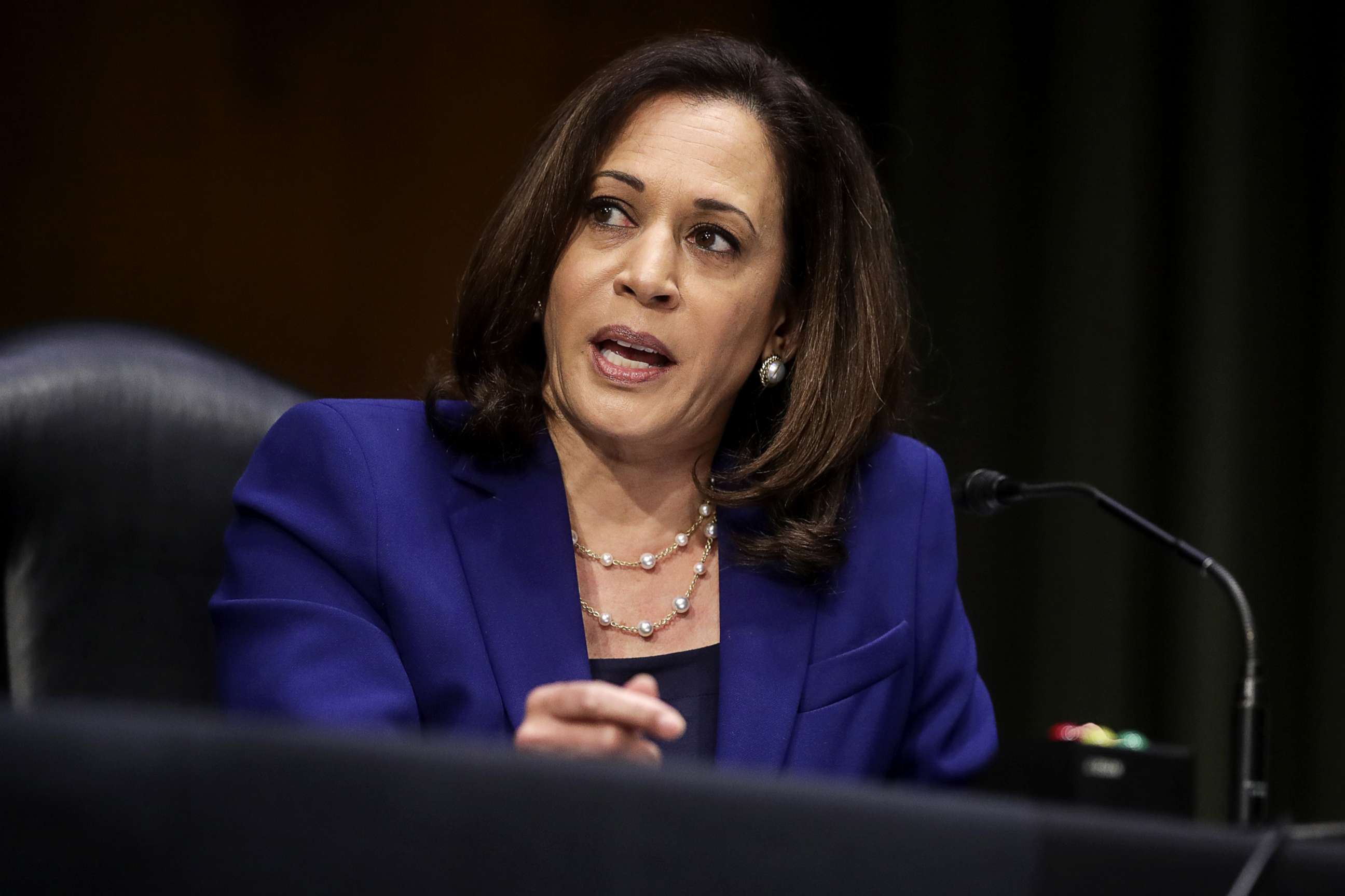
"When we eliminate systemic racism, it will be clear to everyone that the life of a black man is worth more than an allegedly counterfeit $20 bill," Harris said.
Sen. Amy Klobuchar, D-Minn., introducing a witness, acknowledged the unavoidable: Floyd's death happened in her home state.
"If we stand there and demand dominance and wave Bibles, we're no better than monsters," Klobuchar said. "But if we act, and we actually do something and get this bill passed. Well then we're lawmakers, and that will be the legacy of George Floyd."
In Merritt's opening remarks, he went through several names of those who have died in encounters with law enforcement, nodding to the families watching the hearing.
"Will future generations look back at this moment with pride that we confronted our greatest evils with real courage, or will they be disappointed, because we had a moment to make change possible and fail? Right now, that answer still hangs in the balance," he said.
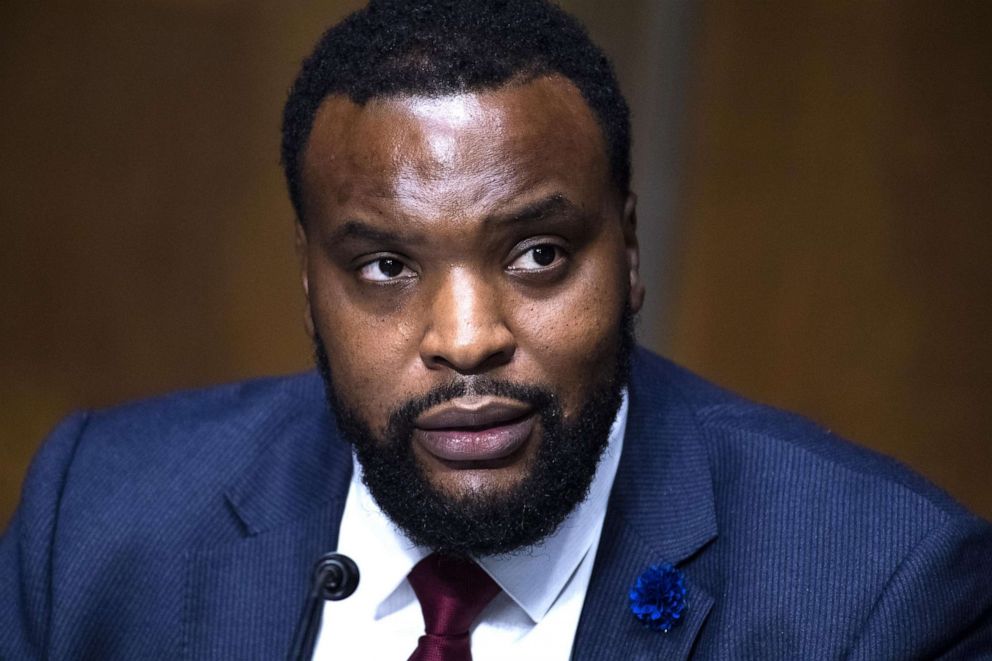
In what turned into a testy exchange between Sen. John Cornyn, R-Texas, and expert witness Vanita Gupta, Cornyn asked Gupta why she used the term "structural racism" instead of "systemic."
"What does that mean," Cornyn questioned, "that means every thing, every institution, every person in America is a racist?"
"It means that there is bias built into existing institutions and the policing," said Gupta, president and CEO of The Leadership Conference on Civil and Human Rights. "I think every American institution has been kind of shaped by forces, and our goal is to do what we can, as policymakers, as advocates, to take that out, and to provide and to try to fight it in the modern day iterations that it appears."
Cornyn asked point-blank: "So you do believe that basically all Americans are racist?"
"I think we all have implicit bias and racial bias. Yes, I do," Gupta replied, to which Cornyn said, "Wow," and then, "You lost me."
Later in the hearing, Sen. Richard Blumenthal, D-Conn., like several of the Democrats who spoke before him, said Trump's executive order on policing fell short and that it's up to Congress to act.
"The elephant in this room is the president of the United States, who issued an executive order today that -- I think almost everyone, privately, would agree -- is mostly empty promises. No real change. No real standards that can be imposed, and so we're going to have to do it on our own," he said.
Booker and Harris rejected "simplistic" evaluations and conclusions on racism, they suggested, were being pushed by Republicans in the hearing. The two Democrats join Scott as the only three black members in the U.S. Senate.
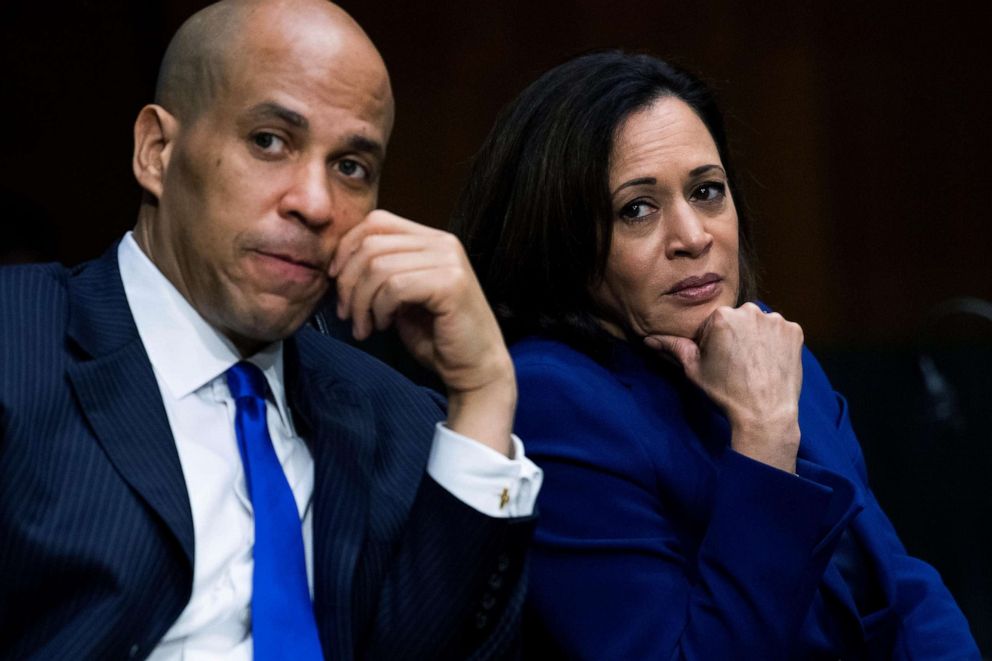
"That somehow systemic racism means you're accusing every single person of being racist couldn't be farther from the truth," Booker said. "What we know is that we have systems within criminal justice, they produce different outcomes depending on a person's race we have them."
He also used the example of how black women are dying in childbirth at "three or four times the rate" of white women, saying, "We have a racial outcome, which is systemically racist."
Gupta, who spoke on systematic racism earlier, agreed with Booker and thanked them for clarifying her position, before Harris echoed Booker. Both have called the other a "partner" in recent weeks.
"To the point of my colleague, Brother Booker's point, that kills the conversation, and it actually insults the intelligence of the American people and rejects the seriousness of this issue," Harris said.
She noted specific data that black men are more likely to get shot by police officers in many parts of the country and are more likely to be arrested on marijuana possession, for examples.
"So let's not let's not fall in a trap of simplifying this in a way that then we don't address the real issue. And so I encourage our colleagues to not fall into these simplistic traps that are really about suggesting that, if we reform the system it is because we are calling everyone in the system racist," Harris said. "We are doing ourselves and the American people an injustice if we fall for that."
Merritt said he believes the "heart of the matter here" is mass incarceration.
"The issue of police brutality in this country is directly tied to mass incarceration. We build so many prisons. We incarcerate more people than any again anyone in human history," he said. "We send our police force, their mission is to keep those prisons full -- with drug users, sick people, poor people. according to our laws, when those people need treatment not incarceration."
ABC News' Trish Turner contributed to this report.




